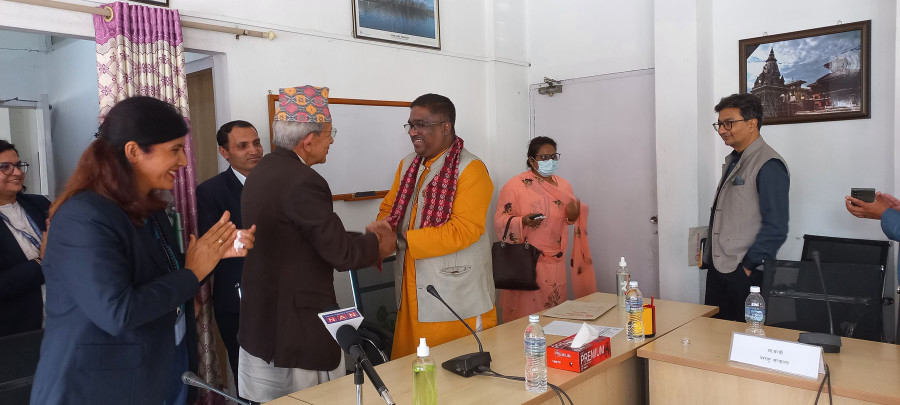National
Ten parliamentary committees get their leaders after prolonged delay
At the meeting of international relations and tourism committee, Foreign Minister NP Saud says SAARC will soon get a new lease of life. Foreign ministers of SAARC members will meet on the sidelines of UN General Assembly.
Post Report
Over nine months after the general election, leaders of 10 thematic committees of the House of Representatives were unanimously elected on Monday, paving the way for discussion on serious national issues.
The first session of the house was called on January 9 after successful general elections in November last year. But due to disputes, claims and counterclaims from different parties, there was a delay in electing the chairs of the thematic committees of the house. The posts of the chairs of the parliamentary committee were divided among Nepali Congress, CPN-UML, CPN (Maoist Centre), Janata Samajbadi Party, Rastriya Prajatantra Party, CPN (Unified Socialist) and Janamat Party. Rastriya Swatantra Party, the fourth largest in the house, however, was barred from leading any thematic committee of the parliament.
The new chairs of the house committees are Santosh Chalise (Nepali Congress), who leads the finance committee; Arzu Rana Deuba (Nepali Congress), who leads the agriculture, cooperatives and natural resources committee; Ramhari Khatiwada (Nepali Congress), the state affairs and good governance committee; Rishikesh Pokhrel (UML), the public accounts committee; Kiran Kumar Sah (UML), the women and social affairs committee; Bimala Subedi (Maoist Centre), the law, justice and human rights committee; Abdul Khan (Janamat Party), industry, commerce, labour and consumer welfare committee; Dipak Singh (RPP), infrastructure development committee; Raj Kishore Yadav (Janata Samajbadi Party), international relations and tourism committee; and Bhanubhakta Joshi (Unified Socialist), health and information technology committee.
Meanwhile, speaking at the meeting of the international relations and tourism committee during the election of Yadav as its chair, Foreign Minister NP Saud said that efforts are on to revive the South Asian Association for Regional Cooperation (SAARC). The regional body of eight South Asian nations is in a moribund state, with its political activities almost passive since 2016. There have been occasional technical meetings at different levels led by bureaucrats but they are not nearly enough to revitalise the regional grouping.
Saud said that a meeting of SAARC foreign ministers will be organised on the sidelines of the 78th United Nations General Assembly in New York in September and that will give a lease of life to the organisation.
Nepal hosted the last SAARC Summit in Kathmandu in 2014 and it was Pakistan’s turn to host the 19th Summit but the event was cancelled after an attack on an Indian military camp in Kashmir. This led to a standoff between India and Pakistan and the summit was put off until further notice. Since 2014, Nepal has been assuming the chair of the regional grouping.
“As chair of SAARC, Nepal has its own obligations,” Foreign Minister Saud said. “We all know about the recent status of the SAARC. We are going to New York to attend the United Nations General Assembly where we have called an informal meeting of the SAARC foreign ministers which will give the organisation a new lease of life.”
There is a long-standing tradition of holding the informal meeting of the SAARC Council of Ministers at the margins of the United Nations General Assembly in New York. But the meeting did not take place in 2021 and 2022. In 2021, the meeting couldn’t take place owing to regime change in Afghanistan following the Taliban’s takeover of the country. In 2022, former foreign minister Narayan Khadka did not travel to New York, so the meeting of the SAARC council of ministers could not sit.
This year, Prime Minister Pushpa Kamal Dahal will lead the Nepali delegation, which includes Foreign Minister Saud, to the UN General Assembly.
“We are hoping that the meeting to be held in New York will also add dynamism to the organisation,” Saud said. “SAARC member states have agreed to appoint a new general secretary, who is expected to take up his new assignment soon.”
Earlier, there was confusion about the appointment of the new SAARC secretary general since it was Afghanistan’s turn to take charge of the position. But since almost none of the SAARC member states recognise the new regime in Kabul, the members sought a new arrangement and decided to allow Bangladesh to assume the role of the secretary general.
Esala Ruwan Weerakoon of Sri Lanka has now completed the term as SAARC secretary general and will be replaced by Golam Sarwar of Bangladesh soon.
Speaking at the same function, Chairman of the CPN (Unified Socialist) Madhav Kumar Nepal said questions are being raised about the ‘interpretative declaration’ of the Millennium Challenge Corporation’s Nepal Compact and the committee should discuss it.
Ahead of the passage of the MCC Nepal Compact from the parliament, political parties had reached a 12-point interpretive declaration, which paved the way for the ratification of the US$ 500 million grant from the house.
“This committee should discuss the burning issues of the country,” Nepal said. “There are also issues related to the boundary and MCC interpretative declaration, among others, that we should discuss.”




 9.7°C Kathmandu
9.7°C Kathmandu













